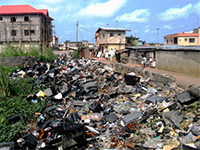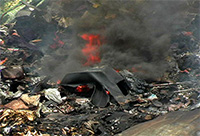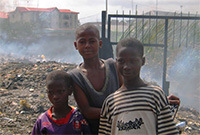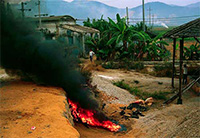Warning: Washington State's e-Waste Rules will Send Old Toxic Computers to Developing Countries
Governor Called Upon to Act Before Law Causes More Global Harm than Good
BAN Press Release
 |
 |
 |
 |
| |
 |
|
| |
Electronic waste dumped in residential area just outside of Alaba market in Lagos. This e-waste is routinely burned here. |
|
 |
 |
 |
| |
 |
|
| |
Burning television at the dump outside of Alaba market, Lagos, Nigeria. |
|
 |
 |
 |
| |
 |
|
| |
Children standing in front of smoldering electronic waste dump just outside of the Alaba market in Lagos, Nigeria. These children live next to the dump. |
|
 |
 |
 |
| |
 |
|
| |
Open burning of plastic encased metal printer and motor parts. Open burning of plastics and other material is common in order to reduce the waste to metals. Guiyu, China. December 2001.
Images ©2007 Basel Action Network |
|
 |
 |
 |
|
| |
12 September 2007 (Seattle, Washington) –
The Seattle-based toxic trade watchdog organization Basel Action Network (BAN) in a letter to the governor today warned that the draft rules for implementing Washington's upcoming program requiring electronics manufacturers to collect and recycle electronic waste across the state will allow foreign dumping of waste electronics containing toxic substances such as mercury, lead, beryllium and brominated flame retardants, and will cause more global harm than good.
In 2002, and again in 2005, BAN shocked the world with their documentaries showing mass dumping of US electronic waste (e-waste) in China and in Nigeria, causing severe damage to human health and the environment. Poor communities there eke out a living with primitive recycling operations that involve unprotected melting, burning and acid stripping of the toxic materials, which dump extraordinary levels of toxins into their ecosystems.
“As written, the rules are an invitation to exploitation,” said Sarah Westervelt, BAN’s e-Waste Project Coordinator. “This bill, that was created so Washington citizens would manage e-waste responsibly, will simply divert the techno-trash from our landfills to the rice paddies of China and the burning dumps in Africa.”
Washington State’s landmark e-waste law, signed by the Governor in March of 2006, and due to go into full force in 2009, was one of the first in the country to hold manufacturers responsible for their toxic products when consumers are done with them. The original bill had language controlling export, but Governor Gregoire vetoed that provision due to the fact that the commerce clause in the US Constitution does not allow states to regulate foreign trade. Environmentalists hoped that the Department of Ecology tasked with writing regulations would be able to otherwise ensure environmentally sound recycling of this problematic waste stream.
Although the Department of Ecology believes it is limited by legal constraints, BAN does not believe the department has gone as far as they can in holding manufacturers directly responsible for the toxic materials throughout final disposition nor in closing the re-use loophole. The Department of Ecology is in the process of finalizing the regulations this fall.
As currently drafted, the proposed regulations provide that manufacturers fund the collection and recycling of computers, monitors and TVs, but they do not stipulate standards for responsible recycling after the materials leave the initial recycling facility, and hold no one accountable for the toxins. Due to the economics of the trade, and the fact that the US government has failed to control toxic waste exports, it is highly likely that under the new legislation Washington’s e-wastes will join the estimated 10.2 million computers exported each year from the US to developing countries.[1]
According to the Department of Ecology's own economic assessment[2] , the costs of exporting Washington’s e-waste are about equal to the costs of processing it domestically. However, if any sort of higher standards are imposed by the state, export will become very attractive and there is nothing in the rules to prevent it. According to the assessment:
“There is a limit to what the processors can charge the plans. This cost comes close to matching the cost of transporting to, and processing in, China. Given this some plans may ship to China. Thus, not all the new or existing flow of business will come to the American processors. This [export] does not affect the cost of the program here in Washington but may affect the unquantified cost of contamination affecting China.”
The draft regulations also appear to create a massive loophole for equipment supposedly going for “reuse” without any standards whatsoever to ensure equipment is working and is actually re-usable. Because electronics manufacturers are only required by the new law to recycle a percentage of whatever e-waste is collected, they will have an economic incentive to minimize volumes coming into the program by redirecting it to alleged re-use, outside of the program, thereby lowering their recycling costs. In 2005, BAN documented how tons of scrap and non-working computers and TVs are shipped each year to Lagos, Nigeria, supposedly for “reuse”, where 75% of it is not re-usable and is simply dumped and burned in wetlands around the city.
“Although Ecology has worked hard to address concerns, the final regulations utterly fail the test of assuring Washington citizens that their toxic e-waste won’t impact poor communities or be dumped after the first recycler,” said Sarah Westervelt. “The only way to do this is to hold the manufacturers directly responsible for the toxins throughout final disposition. They have a brand name to protect, and we all have a planet to protect.”
For more information, contact: Sarah Westervelt - Basel Action Network (206) 652-5555, swestervelt@ban.org
-- For a copy of BAN’s letter to the Governor see: www.ban.org/library/Gregoireletter.html
-- For a more detailed response to the proposed regulations see: www.ban.org/library/ecology.html
-- For more information on the new law: www.ecy.wa.gov/programs/swfa/eproductrecycle
-- For photos of devastating toxics e-dumping in developing countries see: www.ban.org/photogallery/index.html
[1] BAN Report "Exporting Harm" see: http://www.ban.org/E-waste/technotrashfinalcomp.pdf
[2] Small Business Economic Impact Statement for Amendments to Chapter 173-900 WAC; pg 9; http://www.ecy.wa.gov/pubs/0707031.pdf
FAIR USE NOTICE. This document contains copyrighted material whose use has not been specifically authorized by the copyright owner. The Basel Action Network is making this article available in our efforts to advance understanding of ecological sustainability and environmental justice issues. We believe that this constitutes a 'fair use' of the copyrighted material as provided for in section 107 of the US Copyright Law. If you wish to use this copyrighted material for purposes of your own that go beyond 'fair use', you must obtain permission from the copyright owner.
More News
|